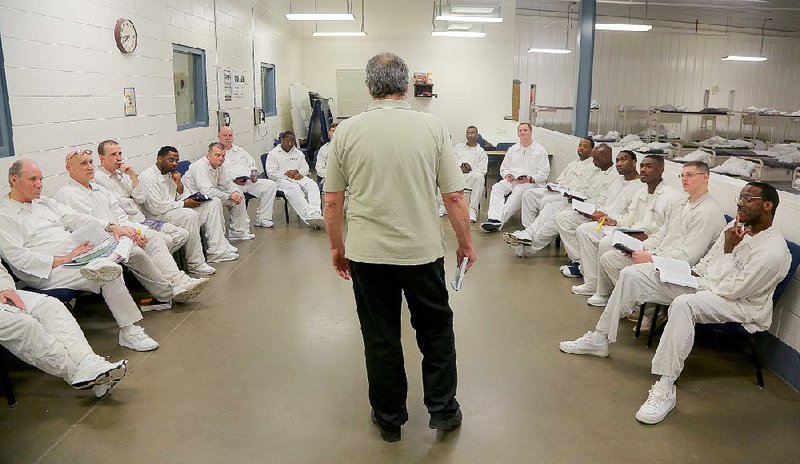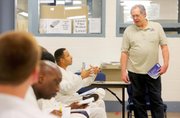Surrounded by floor-to-ceiling shelves with hundreds of books on subjects as varied as controlling anger and starting a business from scratch, 33-year-old Chip Lockwood leaned forward at a round table in the middle of the room.
Wearing a worn, prison-issued white uniform, Lockwood's brown-eyed gaze behind thin wire-rimmed glasses turned misty. He strategically placed both of his hands vertically on the table, about 5 inches apart.
"All of my emotions were in a shoe box. I just kept shoving them all in that box," Lockwood said.
He was 14 when his 6-year-old niece, Morgan Nick, was kidnapped in 1995 from an Alma ball field. His family disintegrated as the still-unsolved disappearance took its toll.
"I just didn't know how to handle those emotions," he said. "I turned to drugs, started cooking dope, because it numbed me."
Lockwood was sentenced in 2010 to 20 years in the Arkansas Department of Correction for criminal conspiracy and possession of drug paraphernalia.
Today, Lockwood is housed at the Hawkins Unit for Males at Wrightsville as he waits for his scheduled 2016 release date and is helping his fellow inmates through an 18-month program that he said has changed the course of his life.
Pathway to Freedom is a Christ-centered program housed in a separate facility at the Wrightsville unit and serves 200 inmates -- violent and nonviolent together. The pre-release program matches outside mentors with prisoners and provides a stringent, boot-camplike curriculum that includes life skills, substance-abuse education, parenting classes, Bible study and work skills.
The Pathway to Freedom program began in the fall of 2011 after the InnerChange Freedom Initiative under the Prison Fellowship organization based in Virginia closed its Arkansas prison program because of a loss in funding.
The Prison Fellowship program was imitated in Arkansas in 2006 under Gov. Mike Huckabee and the Arkansas Board of Corrections. The national Prison Fellowship ministry was founded in 1976 by former White House aide Chuck Colson, who was a special counsel to President Richard Nixon. Colson established the outreach after spending seven months in prison for obstruction of justice in a Watergate-related case.
Scott McLean, the executive director and founder of Pathway to Freedom Inc., said when the other program lost its funding, the prison system and supporters asked him to continue the pre-release efforts under the umbrella of a new nonprofit organization.
"It was just hard economic times, so they had to make some strategic changes," McLean said of the former program. "I thought we were going to have more time to make the transition, but I had to come out of that meeting and hit the ground running."
Arkansas Department of Correction Director Wendy Kelley said the Pathway to Freedom ministry has proved to be a "wonderful opportunity for inmates who want to make a change in their lives."
"It provides the tools and a mentor to ensure there isn't an excuse for failure," she said. "The inmates who graduate that program have made lifelong changes, and that is a tremendous accomplishment. The importance of the dedicated staff and volunteers in that program can't be stressed enough."
Iron Sharpens Iron
On a recent Thursday night at the Hawkins Unit a sea of dingy white prison uniforms began converging behind a seemingly endless wall of windows. Without prompting, inmates gathered Bibles, books and pencils from their bunks and tucked the tools under their arms as they formed single-file lines in front of locked metal doors.
The white-faced clock on the wall chimed the hour, and a shrill buzzer filled the air as the doors simultaneously unlocked. The hundreds of prisoners automatically -- and quietly -- filtered into various classrooms staffed by volunteer mentors guiding the participants through particular areas of study.
Leaning against a wall with his ankles crossed, mentor Euel Dove unfolded his arms and pointed to McLean standing sentry at the front of the hallway.
"He doesn't take any crap," Dove said. "They respect him. You notice we don't have but a couple of guards here. Don't need 'em. We never have any problems."
Dove followed about a dozen inmates into a classroom. The men formed a wide circle before Dove asked the men to bow their heads for a moment of silence. While Pathway to Freedom is Christian-based, the program is open to those of all faiths.
The men opened the well-worn and highlighted "Celebrate Recovery" books, flipping to the latest chapter of the addiction-breaking lesson plan. The men took turns reading and sharing their insights.
"We have to support one another; not try to do this on our own," one said.
Another raised his hand, opened his mouth then paused to gather his thoughts.
"I don't believe sobriety alone brings wholeness of mind," he said. "You've got to have the right attitude."
Dove smiled, then boomed: "What's that attitude?"
"The attitude of gratitude," the men shouted in unison.
In a room across the hall, chairs were turned sideways to squeeze together about a dozen men among walls of clunky desktop computers.
Mentor Mike Young pointed to one of three men who raised their hands during a lively debate on the biblical story of Barnabas.
"This chapter stood out to me because God used them mightily, and he changed something about them," one inmate said.
Young then called on Lockwood, who adjusted his glasses before labeling Barnabas the "original mentor."
"He wasn't afraid to call Timothy on the carpet. He was real," Lockwood said. "Mentors don't just tell you what you want to hear. They get in your face and say, 'Hey, dude, you're going to bump your head.'"
Ben Thomas, who is serving a 20-year sentence for second-degree murder, said the Pathways to Freedom ministry reprograms the participant from the inside out and debunks old beliefs.
"This is life-changing. I didn't trust anyone. The environment here is so different. We rely on each other," Thomas said, then laughed.
"When I first got here from the main prison, one of the men tried to hug me. I jumped back. It really freaked me out at first. Scotty [McLean], he's the one who coached me through it. He pointed out biblical principles and encouraged me to let go. You don't have to wear a mask in there. The program is all I've got now."
Pathways to Freedom board chairman and former state Rep. Deborah Hobbs said the program was initially a hard sell for her. The changing point, she said, came during a tour of the facility when a "big man who just towered over me came up and said, 'I had plans when I got out of this place, but now my plans have changed.' That sold me right there."
"I'm a Republican. We're tough on crime," she said. "We can talk about prison reform, but until the prisoner has been transformed, it's not going to work. These people are going to get out. Do we want them to go back into the community the same way they came in, or as changed men?"
On the other side
When 27-year-old Jeremy Anderson was released from prison in June, he was outfitted with a written business plan, nearly $5,000 he had earned in the prison work-release program and a mentor on the outside who would guide him through the perils of starting over.
Anderson -- who served more than eight years of a 25-year sentence for robbery -- said he was "bred" into a life of crime by growing up with a drug-addicted mother and being constantly surrounded by family and friends who were on the wrong side of the law.
"I was very poor growing up. We lived in a house with all the utilities cut off. We had to get water to take baths. I was in a position where I had to steal food. I felt like I had to kick in doors and break into people's houses, take from people the things I didn't have," Anderson said.
"My whole family was all about crime. That was all I knew. When I first got incarcerated, I wasn't even afraid because I knew this was going to happen. I just thought that prison was part of life."
It wasn't until he was accepted into the Pathways to Freedom program and learned its core values -- integrity, community, affirmation, responsibility, productivity and restoration -- that Anderson said he realized his life could be different.
Anderson took advantage of the program's Ice House Entrepreneurship curriculum, which brings in the state's business leaders to teach the inmates how to start their own businesses, manage finances, and market their products and services.
Today, Anderson is the owner of Andy's Mobile Detail and Janitorial. He has two people working under him, owns a service van, equipment and the materials. He recently signed an exclusive contract with a Jacksonville car dealership to detail its vehicles.
Anderson graduated top in his class from a Falcon Jet upholstery program and has a rack delivery route for the Arkansas Democrat-Gazette.
"There are days that I work 17 hours a day," he said. "The program is all about taking the negativity and turning it into something possible. I will never go back to prison. Never.
"If you do three things once you get out of the program, you will never go back to prison: Call your mentor, go to church and go to work."
Inmate T.J. West -- serving a 50-year sentence for residential burglary and kidnapping -- said the program took him from an instant-gratification mindset to one of focused planning for the future. Through the Ice House Entrepreneurial Program, West has drafted a business plan for a mobile fitness venture.
"There's so much freedom in changing your core beliefs," West said. "Don't listen to the negativity. Don't be enamored with fear. The sooner you let go and believe, the sooner you will reach your goals and dreams."
McLean said he could not provide solid recidivism rates -- how many graduates from the program end up back in prison -- because the statistics are not collected until after prisoners have been out for three years. However, of the 88 program graduates since 2011, eight have again committed crimes, he said.
"I'm excited about the direction of Pathway to Freedom and of the passion and commitment of the Correction Department and Gov. Asa Hutchinson," McLean said.
Hutchinson unveiled a strategy Wednesday for dealing with prison crowding that included investments in programs aimed at preventing inmates from returning to prison.
"The governor is taking the lead and nurturing the re-entry program. We're getting all of us involved and not just the state trying to do it alone," McLean said.
Hope and a Future
Funded solely through the contributions from private entities, churches and individuals, the facility is the only thing provided by the state to the Pathway to Freedom program.
The transition from the state-supported Prison Fellowship program to the private nonprofit Pathway to Freedom ministry reduced the program's annual budget from about $827,000 to about $400,000.
McLean -- who according to the organization's Internal Revenue Service Form 990 earns an annual salary and other compensation of $75,408 -- said the program's greatest challenge is maintaining that funding to keep the doors open.
"That's a constant thing. Sustainability is important to the program," McLean said. "It's a joy knowing we're able to do this with no funding from the state. Thank God for the churches and people who have come along and continue to contribute."
Lockwood said the program is an investment not only in reducing crime, but in creating future community and business leaders.
"Prison is the perfect construction zone," he said. "I thought I was so far gone, but this program changes you to the core. Now I want to leave here and be the best husband, the best father, the best businessman that I can be. This is God's reward. Your choices are your character, and your choices are your future."
State Desk on 02/22/2015


